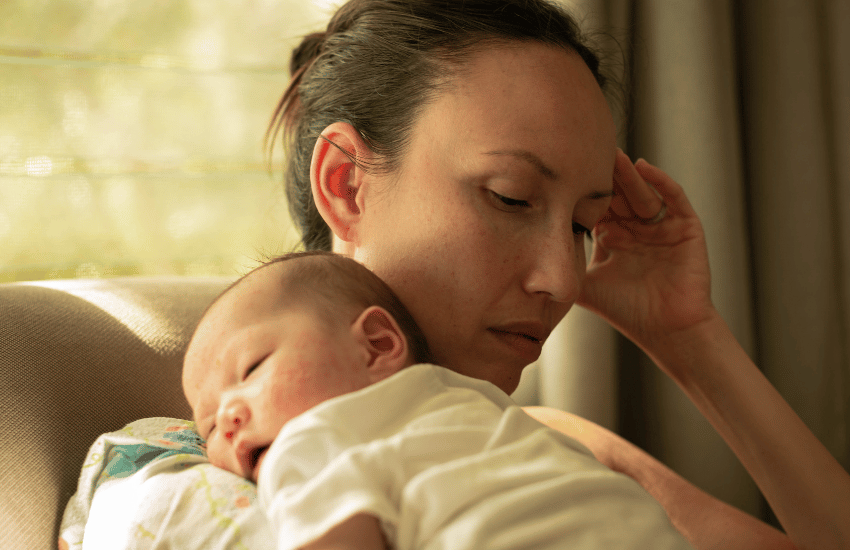
As a mother and licensed therapist, I deeply understand the unique challenges that can come with motherhood. Changes in roles, responsibilities, and expectations often leave you feeling pulled in different directions and unsure of who you are.
If you find yourself in this stage of life, you aren’t alone. Many women go through periods where they feel lost and confused about their identity. While every person doesn’t experience being a mom in exactly the same way, there are a lot of aspects that we share. Let’s look at seven reasons you might be losing yourself in motherhood, ways to cope, and how to reconnect with yourself.
7 reasons why
Lack of freedom
Whether you have one child or multiple children, your schedule as a parent often revolves around your kids. You’re not able to freely move about like you once did. It’s more difficult to schedule last-minute plans or go out. Now it may take extra planning to get a babysitter, so that you can hang out with friends or go on a date with your partner. Even regular errands are subject to nap times and school pick-up and drop-off.
Leaving the house now requires a packed bag of supplies for your child, a stroller, or items to keep them occupied while you’re out. You can’t just grab your keys anymore and head out when you feel like it. Being unable to leave spontaneously or whenever you want to can feel limiting. You may not be able to have as much quality time with friends, do activities you enjoy, or get time to yourself as much as you were used to before kids. When your life revolves around your kids, you may feel disconnected from yourself.
Carrying the mental load
Many women carry the mental load for their household, whether they are a married or single mom. This is the unseen mental and emotional labor that goes into running a household and caring for a family, and may include:
- Meal planning and grocery shopping
- Coordinating schedules and transportation (e.g., school pick up/drop off and after-school activities)
- Noticing and keeping track of what needs to get done around the home
- Scheduling and remembering medical, dental, and other health-related appointments for children
- Managing medications and health insurance
- Remembering birthdays, anniversaries, and other important dates
- Planning gatherings and social events
- Coordinating with in-laws for visits and celebrations
- Providing emotional support to your children and partner
- Mediating conflicts and managing family dynamics
Managing your and your child’s life, maintaining a home, and working either inside or outside the home requires a lot of mental, emotional, and physical energy. It’s not surprising that you’d have less mental space at the end of the day. When you have personal time, you may want to simply lay on the couch and scroll. Your life might feel like you’re barely getting through each day, trying to make sure you’re being a good mom AND that everything gets done. When you’re struggling to keep up with everything, your needs and wants may take a backseat.
Changes in roles
I believe there is some truth to the saying, that having a baby changes everything. Becoming a mother shifts many aspects of life. You go from being an individual to being a parent who is now responsible for a child. They need you a lot, especially when they’re a baby or a young child, and at times it can feel overwhelming.
Raising kids can change your roles at home, in your career, and within your relationships with loved ones. When the majority of your free time is spent caring for your kids, it’s difficult to connect with yourself or your partner. The two of you may see each other as roommates trying to keep the home afloat and your children alive.
A large part of your identity may have been connected to your career or activities you enjoy in your free time. If those parts of your life change after you’ve had kids, it can seem like that was your old self you don’t know anymore.
Postpartum anxiety, depression, or OCD
Mental health concerns, such as depression, anxiety, or OCD can profoundly impact a new mom and lead to identity loss. Postpartum depression affects around 7% of moms and postpartum anxiety impacts nearly 10% of mothers. These conditions can engulf you with overwhelming worries, fears, and intrusive thoughts, making it difficult to focus on anything beyond the immediate demands of caring for a newborn.
The relentless pressure to be a good mom and care for your baby, combined with hormonal changes and sleep deprivation (common in the postpartum period), can erode your sense of identity and self-worth. If you feel guilty or are consumed with hopelessness, sadness, or anxiety, your own needs and interests may fade into the background. This can leave you feeling isolated and disconnected from your former self.
Sleep deprivation
Giving birth and caring for a newborn typically takes most of your energy in those first few months postpartum. After the marathon of labor and delivery, you’re sent home to care for a new human who requires 24/7 care and doesn’t sleep more than a few hours at night. No wonder, many new moms feel depleted and exhausted!
Chronic fatigue impairs cognitive functions and emotional stability, making it difficult to manage daily tasks, cope, and engage in self-care or hobbies that nurture your identity. Emotional instability and reduced patience from lack of sleep heighten feelings of frustration and being overwhelmed. Then exhaustion can lead to isolation from loved ones. This creates a vicious cycle where the stress of sleep deprivation worsens mental health issues like postpartum depression and anxiety, further affecting your sense of self.
Individualist society
Living in an individualistic culture can cause you to lose your sense of self because of the extensive responsibilities placed on you as a mother. When you don’t have a strong support system, you’re often left to independently manage child-rearing, household responsibilities, and personal or professional achievements without sufficient communal support. This can create an overwhelming sense of isolation and self-reliance, where you feel solely responsible for your child’s well-being. When this happens, it’s not uncommon to neglect your own life and well-being, causing you to lose touch with yourself.
Expectations to be a perfect mom
Unrealistic expectations impose an unachievable standard of perfection. The media, society, and your loved ones may pressure you to be the “perfect mother.” Someone who flawlessly balances childcare, household duties, career, and personal life. You may also have internalized these expectations for yourself because of past experiences or childhood wounds.
Constantly striving for perfection leads to self-criticism and guilt when these unattainable standards aren’t met. As a result, you may prioritize your children’s needs and outside expectations over your well-being. This relentless pursuit of being the best mom can harm your sense of identity, leaving you feeling inadequate and detached from your true self.

How to cope with losing yourself as a mom
The path to renewing your sense of self is unique to you. Below you’ll find strategies to help you on that journey, but it may take some trial and error to find the ones that work best for you.
Set Aside Alone Time
- Example: You schedule one hour every weekend for a hobby you enjoy. (E.g., reading, painting, or walking.)
- How to do it: Identify an activity that brings you joy and relaxation. Communicate with your partner or support network to ensure you have uninterrupted time. Start with small, manageable time slots and gradually increase them as you can. (You can be an amazing mom AND prioritize your well-being!)
Seek Support from Your Community
- Example: Join a local parenting group or an online community. (E.g., support groups, book clubs, moms meetups, etc.)
- How to do it: You can search via social media or ask your pediatrician, therapist, or friends if they know of any groups related to parenting or your personal interests.
Delegate Responsibilities
- Example: Release specific household chores to your partner and older children.
- How to do it: Schedule a discussion with your partner or a family meeting. List all household tasks and identify which can be delegated. Communicate clearly with each member about their roles and responsibilities. Regularly review and adjust the distribution of tasks as needed.
Practice Self-Compassion
- Example: Gently remind yourself that it’s okay to have off days and you do not need to be perfect.
- How to do it: Find moments during the day, when you can pause to breathe and ask your body what she needs to feel cared for today. If possible, meet that need and allow yourself to take breaks and rest without guilt.
Pursue Your Goals
- Example: Work toward professional or personal goals. (E.g., walk 3 times a week, complete a coding certification, etc.)
- How to do it: Set aside time to identify goals that are meaningful and fulfilling to you. Then break down those goals into manageable steps and create a timeline. Dedicate specific times each week to work towards these goals.
Focus on Self-Care
- Example: Incorporate daily self-care routines, such as a morning meditation or evening skincare.
- How to do it: Identify activities that you enjoy and that rejuvenate you. Integrate them into your daily or weekly routine. Treat self-care as a non-negotiable part of your schedule.
Communicate Needs and Boundaries
- Example: Discuss with your partner about your need for quality alone time and set boundaries to protect it.
- How to do it: Clearly express your needs and feelings to your partner and loved ones. Establish and maintain boundaries around your time and space. Encourage open and honest communication within your family to support mutual understanding and respect.
Seek Professional Help if Needed
- Example: If you’re feeling overwhelmed or lost, ask for help.
- How to do it: Recognize when feelings of stress, anxiety, or depression are becoming unmanageable. Find a licensed therapist in your area via Psychology Today or Therapy Den. Meet for a consultation with them to determine if they are a good fit for you.
In my experience
Much of my work with mothers and parents over the years has focused on helping them reconnect with themselves. Darya began therapy because she was feeling burned out and lost. She had three sons and was working as a college professor, but had taken a leave of absence from work due to her health. She came to see me one year after she’d given birth to her third child.
Our first goal was to help her reconnect with her body. In sessions, she practiced being present in her body and learning to listen to her. By attuning to her body, she began to understand what she physically, emotionally, and mentally needed to care for herself and heal.
Throughout therapy, she reconnected with herself and the aspects of life that made her feel happy again. We identified practical ways to establish “me time” and how to talk to her husband about her needs and dividing the care for their young kids. She explored and released expectations that no longer served her. She also uncovered parts of herself that she loved and determined what living as the best version of herself meant.

Get the support you need to embody your authentic self in motherhood.
If you feel like you’re losing yourself in motherhood, you aren’t alone. Many other moms feel the same way. At Spiral and Bloom, I’ve helped countless moms from all walks of life rediscover themselves and reconnect to their bodies and joy. I’d be honored to join you on your healing journey. Reach out today for a free consultation.
Sources
Anokye, R., et al., “Prevalence of postpartum depression and interventions utilized for its management.” Annals of General Psychiatry, 2018. Accessed June 23, 2024.
“Postpartum and Antepartum Anxiety | Postpartum Support.” Postpartum Support International (PSI). Accessed June 23, 2024.